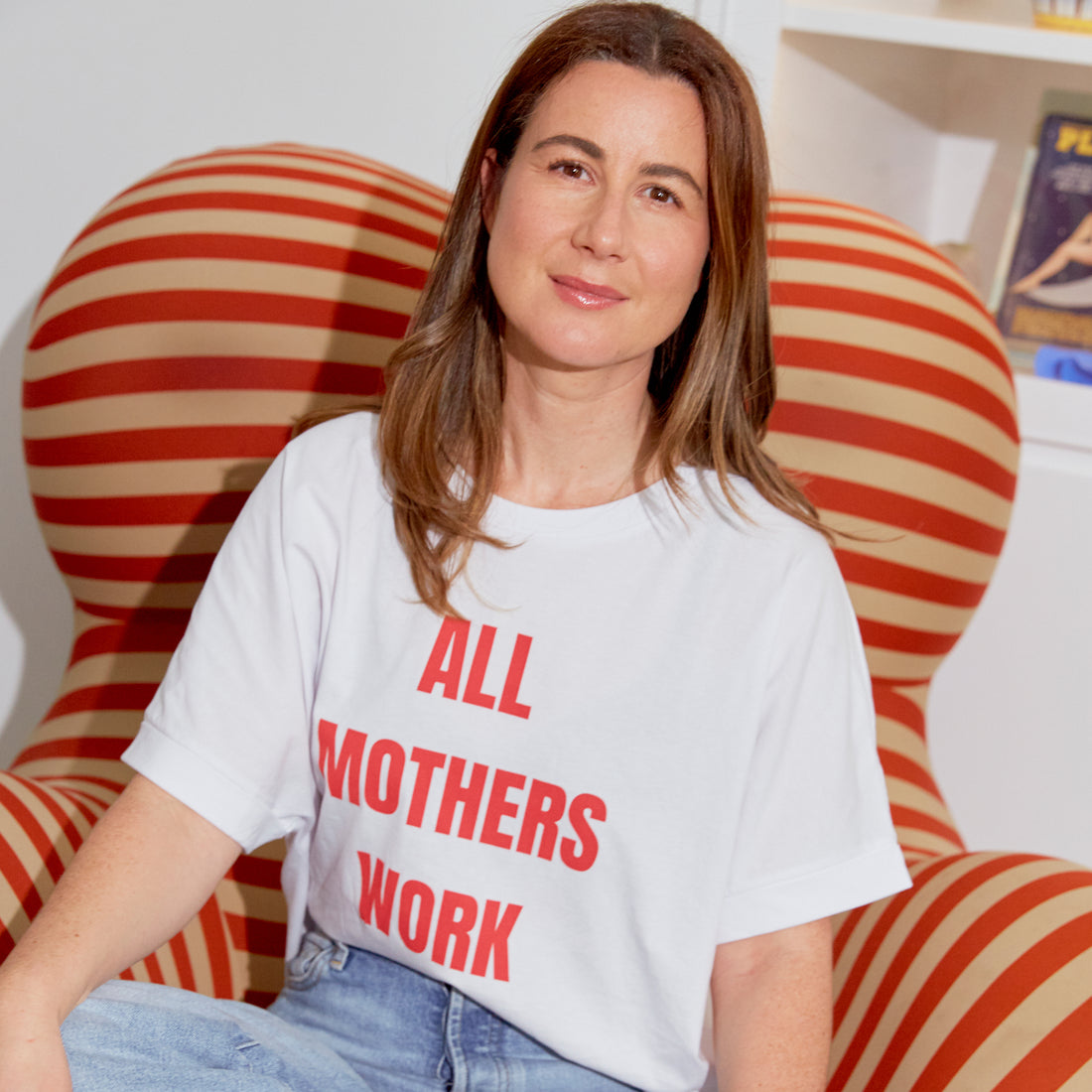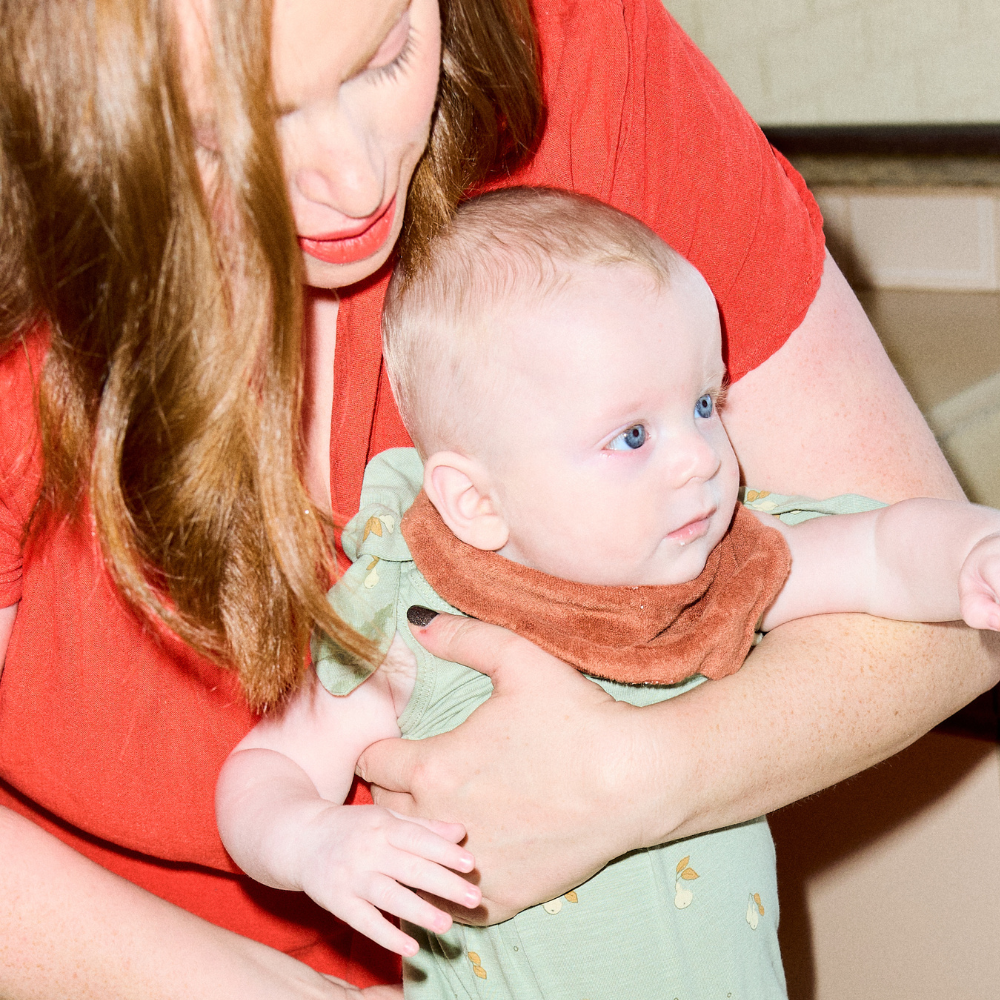How the Parents Work Collective is changing the way we think about motherhood
Virginia Tapscott and Alannah Batho are both in full time, unpaid caring roles, as mothers to six children between them. If that sentence makes you feel uncomfortable — calling mothering “unpaid work” — then this is a story for you. Because it was this, the unpaid work, of this great journey of motherhood that caused a stir inside of them, leading to the creation of the Parents Work Collective.
The two women have paid work too, Virginia is a journalist, and Alannah a lawyer, but more impressive is that they’re creating a space for change, empowering parents and helping to (hopefully) put some systems in place for true support for parents in caregiving roles across the country. Because the devaluation of care work is both toxic and damaging to all parents, it’s a systemic problem, a cultural problem, and a feminist issue. And it affects all of us.
Together, we want to change the narrative, starting with the language we use. All mothers work, and it’s time we own that, regardless of what “paid work” we do, or family situation we have. The thing that binds us is our shared experience of parenthood, and calling it work doesn’t erase the magic moments: it just reframes the viewpoint.
Let’s get to know the Parents Work Collective.
What is the Parents Work Collective all about?
Like many things, it began with parenthood, when Virginia and Alannah recognised one of the great unspoken truths about the experience. “We realised that the way our society expects parents to combine parenting with paid work is really problematic.” They knew that parenting should be joyful and meaningful — that’s what we all sign up for — but because of the current economic reality both parents often need to perform paid work. It can be really overwhelming and stressful. “We felt like we were being robbed of time with our children and we felt unable to enjoy parenting in the way we had envisaged. We also recognised it would be exponentially harder for single parents, parents who have kids with additional needs, and parents with less privilege and socio-economic support structures around them.” they said.
The reason for this was clear: unpaid care work is mostly invisible and inherently devalued in modern Western culture, and not only that, it comes with a second realisation: “The immense value of care work is simply not being talked about, and when the devaluation of care work is raised, the solutions almost always centre around ways to enable people to do less care work, rather than how we can actually support people to do that work.”
This awareness was alienating for Virginia and Alannah— and, we’re willing to bet, for most of us. When parenting, we all are doing one of the most important and meaningful things in our life, and it wasn’t being reflected in society or in policy. “We wanted to be supported in our contribution and to find a way that we and our partners could better combine our unpaid care work with our paid work,” they said. And so the idea for the Parents Work Collective was born.
They describe it as “the voice we thought was missing from the conversation” to advocate for broad structural changes to help make the lives of parents and children more joyful and satisfying. “We want the value of unpaid care and labour to be more visible in government consultation and policy development, but also more visible in society.”
Why should we care about unpaid labour?
If you think this doesn’t apply to you… think again. As Virginia and Alannah point out, “unpaid labour is the biggest sector in any country around the world, including Australia where it is worth about $650.1 billion (Workplace Gender Equality Agency).” Not only does it cost women and families hundreds of thousands of dollars in lost income, lost super and lost pay rises, the knock-on effects are low representation leadership roles, government and community.
While women are taking on greater amounts of paid work than ever before, this has only tipped the scales even more against our favour, because the unpaid labour (the parenting and household work) still overwhelmingly weighs on the women. So not only are we doing more paid work, we’re not offloading the unpaid work. “The Household, Income and Labour Dynamics in Australia (HILDA) data shows women still take on about 21 more hours of unpaid work than men per week. This gap has closed from around 29 additional unpaid hours per week in 2002, but mainly due to women actually doing less unpaid work rather than men doing more.” Let that just sink in for a moment.
How, as a society can we change this narrative?
The billion-dollar question. Pre-kids, many of us have been guilty of subscribing to the viewpoint that care work isn’t really “work”, and that is testament to how deeply ingrained — and deeply undervalued — it is. “We think it’s really important that as a society we develop an awareness of these perceptions and ultimately how they shape our policies, our beliefs and our value systems,” says Virgina and Alannah. “Let’s be clear on one thing: all parents work. And all parents are making a valuable contribution and investment in society that is worthy of support (on community and government levels).” If we can, as a society, accept that care work is work too, it follows that parents will need support and respite from that work — just as they receive in paid jobs.
Is there a solution?
Of course when systemic change is needed, the road is a long one. But for Alannah and Virginia their vision would see us (Australia) move towards a flexible dual earner/carer model that would support parents to share in both paid work and the care of their children. So, how do we go about this? Is it financial, or a change to our support structures? Alanah and Virginia say it’s both: “the financial penalty of care work is the biggest driver of gender inequality. Remuneration for care work is a way we can immediately and drastically reduce the lifetime gender pay gap and reduce the inequalities associated with financial disadvantage. This idea can seem radical if we don’t consider care work as real work, or if we don’t acknowledge the wide-ranging benefits of gender equality.“
From a support structure perspective this means support for all aspects of parenthood: prenatal appointments, mental health services for parents, better postpartum health care — all of it. “It is the government’s responsibility to develop a social welfare system and workplace legislation to ensure unpaid care work is not exploited or carried out to the detriment of individuals who perform that work.”
But it’s not just big government changes — businesses can play a part on the ground level too. Looking at things like workplace flexibility for caregivers, which has been shown to lessen turnover and improve workplace culture anyway, or another big one: changing our current “overwork” culture. Typical paid work hours in Australia are increasing with many people now working 50+ hours a week, and the culture rewarding this wearing busyness like a badge of honour. “A culture of excessive working hours means that many men are effectively locked out of participating in care work, and many women are locked out from working in “big” jobs (high status, high pay and long hours),” says Virginia and Alannah.
Starting the conversation
The good news is: we can all be part of the change. Acknowledging the disparity, and the bias is the first thing. Changing the way we talk about unpaid work is another. And then there’s the conversations to have with your partner, which all comes down to your own values and what’s important to you and your family. Just because it’s always been done a certain way, or society has set us up to believe it’s the only way, it doesn’t mean that it works for you. The conversation is ongoing, and will change as your children grow.
And, if reading this stirred something inside you, you can support the Parents Work Collective (via their mailing list and instagram) and be part of the community that’s creating the change.
As Virginia and Alannah articulate, so perfectly: “Obviously we can’t live in a culture that doesn’t exist yet, but we have to start somewhere. We have to assign value to ourselves and our bodies and the work we do, before we can expect others to value it appropriately. Contributions like breastfeeding are only free if our bodies are worthless. Once we fully realise our intrinsic value we can act on it and demand better.”


















